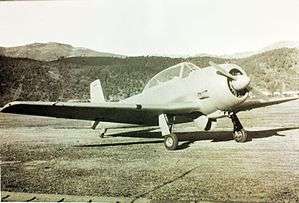Piaggio P.150
| Piaggio P.150 | |
|---|---|
 | |
| Role | Training monoplane |
| Manufacturer | Piaggio Aero |
| First flight | 1952 |
| Retired | 1954 |
| Primary user | Italian Air Force |
| Number built | 1 |
|
| |
The Piaggio P.150 was an 1950s Italian two-seat trainer designed and built by Piaggio to meet an Italian Air Force requirement to replace the North American T-6.
Development
The P.150 was designed and built to complete as an Italian Air Force T-6 replacement against the Fiat G.49 and Macchi MB.323. The P.150 was an all-metal low-wing cantilever monoplane with a wide-track retractable tailwheel landing gear. The pilot and instructor were in tandem under one glazed canopy. Originally powered by a Pratt & Whitney Wasp radial engine and later an Alvis Leonides engine. The aircraft was not chosen and did not go into production.
Operators
- Italian Air Force operated only one aircraft for test evaluation from 1952 until 1954 [1]
Specifications (P.150)
Data from Jane's All The World's Aircraft 1953-54 [2]
General characteristics
- Crew: 2
- Length: 9.25 m (30 ft 4 in)
- Wingspan: 12.9 m (42 ft 4 in)
- Height: 2.80 m (9 ft 2 in)
- Wing area: 25.20 m2 (271 ft2)
- Empty weight: 1,940 kg (4,277 lb)
- Gross weight: 2,540 kg (5,600 lb)
- Powerplant: 1 × Pratt & Whitney R-1340-S3H1 Wasp radial engine, 447 kW (600 hp)
Performance
- Maximum speed: 350 km/h (218 mph)
- Cruising speed: 315 km/h (196 mph)
- Range: 1,400 km (870 miles)
- Endurance: 4 hours 30 min
- Service ceiling: 7,300 m (23,950 ft)
See also
- Aircraft of comparable role, configuration and era
References
| Wikimedia Commons has media related to Piaggio P.150. |
- ↑ aeroflight
- ↑ Bridgman 1953, p.163.
- Bridgman, Leonard (ed.) (1953). Jane's All The World's Aircraft 1953-54. London: Jan's.
- The Illustrated Encyclopedia of Aircraft (Part Work 1982-1985), 1985, Orbis Publishing, Page 2714
This article is issued from Wikipedia - version of the 6/23/2015. The text is available under the Creative Commons Attribution/Share Alike but additional terms may apply for the media files.